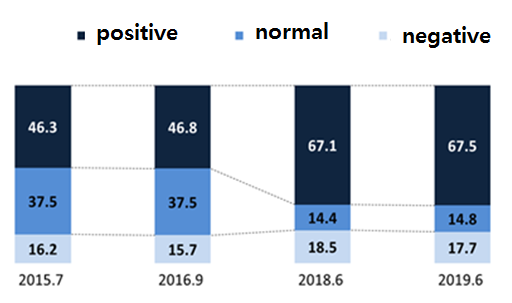KCA News & Media
Press Release
Press Release
| Survey finds FTAs have brought positive effects to the overall domestic market | ||||||||||||||||||||||||||||||||||||||||||||||||||||||||||||||||||||||||||||||||||||||||||||
|---|---|---|---|---|---|---|---|---|---|---|---|---|---|---|---|---|---|---|---|---|---|---|---|---|---|---|---|---|---|---|---|---|---|---|---|---|---|---|---|---|---|---|---|---|---|---|---|---|---|---|---|---|---|---|---|---|---|---|---|---|---|---|---|---|---|---|---|---|---|---|---|---|---|---|---|---|---|---|---|---|---|---|---|---|---|---|---|---|---|---|---|---|
| Date | 2019-11-22 | Hit | 1298 | |||||||||||||||||||||||||||||||||||||||||||||||||||||||||||||||||||||||||||||||||||||||||
|
Survey finds FTAs have brought positive effects to the overall domestic market - ‘Fruits’and ‘alcoholic beverages’ earned the largest share of respondents in the expanded range of choices and quality improvement, and in price reduction, respectively. -
Since the first Free Trade Agreement was signed with Chile in 2004 (hereinafter referred to as ‘FTA’), Korea has concluded 16 FTAs with 54 countries.
To mark the 15th anniversary of signing the first FTA with Chile, the Korea Consumer Agency (President Lee Hee-sook) conducted a consumer survey on the welfare effects of FTAs. The survey was conducted for 3,000 male and female consumers aged 15-29 who had perceived the FTA signings and purchased imported consumer products from 16 different product groups. □ FTAs brought positive effects (the range of product choices expanded, prices reduced, etc.) to the overall domestic market.
□ Fruits and alcoholic beverages gained the largest share of respondents in the expanded range of product choices, and price reduction, respectively.
According to the survey on the consumer welfare effects of 16 imported consumer product groups, in terms of the expanded range of choices, ‘fruits (87.5%)’ gained the largest share of respondents and ‘bottled water (59.7%)’ gained the lowest.
In addition, ‘alcoholic beverages,’ and ‘fruits’ gained the largest share of respondents (66.4% and 76.3%) in terms of price reduction and quality improvement, respectively. On the other hand, ‘cosmetics’ won the smallest share of respondents (26.6%) in price reduction, and ‘bottled water’ received the smallest share of respondents (38.3%) in quality improvement.
In the meantime, according to the consumer survey on the degree of satisfaction with purchases made for 16 different product groups, 83.3% of the respondents said that the level of their purchase satisfaction with ‘alcoholic beverages’ became higher, followed by ‘health supplement foods (79.0%),’ ‘fruits (77.1%)’, etc. However, ‘bottled water (44.3%) recorded the lowest degree of satisfaction with purchases made.
[ Reasons for the consumer welfare effects of 16 product groups and the degree of satisfaction with purchases made ] (unit: the number of persons, %)
□ The most commonly-cited reasons for purchase regret were safety or hygiene-related problems, insufficient information, dissatisfaction with after-sales service, etc.
In order to identify factors reducing the consumer welfare effects of FTAs, the KCA conducted a survey on reasons for post-purchase regrets regarding imported consumer goods, and found that ‘food safety or hygiene’-related problems were the biggest reason for consumers’ purchase regrets. In particular, the respondents surveyed said they frequently had the feeling of regret after having purchased fresh foods, including ‘fruits (63.2%)’, ‘livestock products (68.1%)’ and ‘marine products (65.0%).’
Also, as for alcoholic beverages, pet products, health supplement foods, cosmetics, and cleaning agents, ‘a lack of information provided’ was a main source of post-purchase regret, and for glasses, small home appliances, and automobiles, ‘dissatisfaction with after-sales service’ was the most commonly-cited reason for purchase regret.
An official from the KCA said, “Consumers’ positive perceptions about FTAs will be conducive to the implementation of policies to promote FTAs in the future.” The KCA plans to provide relevant government organizations with the survey results so that they can be used as a basis for devising FTA-related consumer policies. |
||||||||||||||||||||||||||||||||||||||||||||||||||||||||||||||||||||||||||||||||||||||||||||
| Next | 2019 consumer orientation level of the Korean service market scored 77.6 points in consumer evaluation, which slightly decreased compared to 2017. | |||||||||||||||||||||||||||||||||||||||||||||||||||||||||||||||||||||||||||||||||||||||||||
| Prev | Prior review for online medical service advertisements on Youtube and SNS channels should be strengthened. | |||||||||||||||||||||||||||||||||||||||||||||||||||||||||||||||||||||||||||||||||||||||||||


